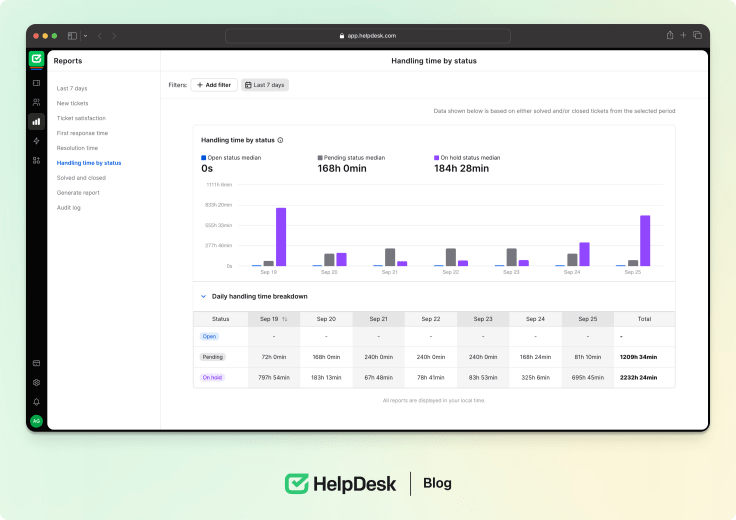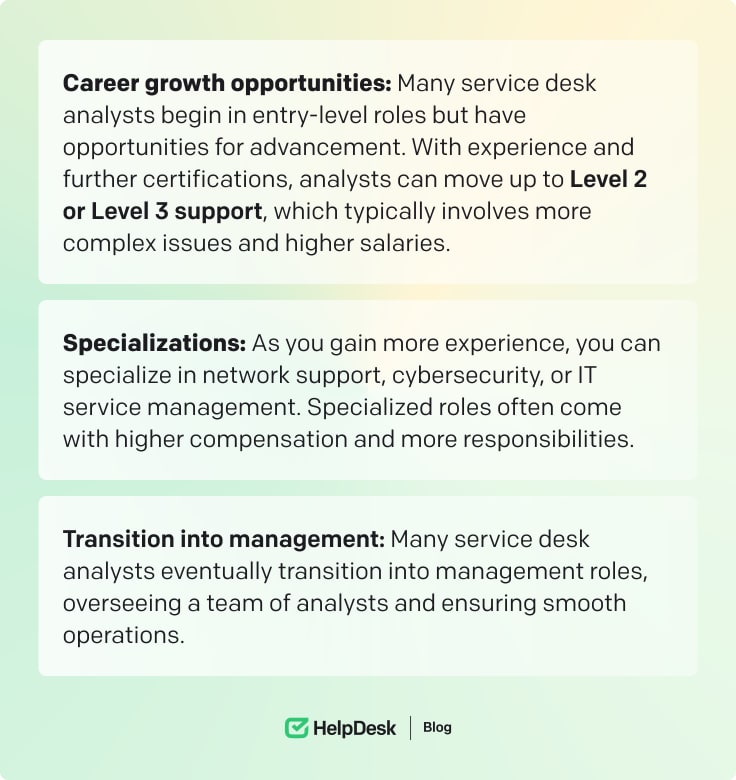Imagine this: you’re running a busy office, the hum of computers and phones creating a steady rhythm of productivity. Suddenly, one of those systems goes down — a server glitch, an app that refuses to open, or a network that crashes just as you’re finalizing an important project. Panic spreads as deadlines loom and everything grinds to a halt.
But then, like a calm guide in the chaos, the service desk analyst (SDA) steps in. These unsung heroes in IT swoop in to diagnose, troubleshoot, and resolve technical issues, restoring order in a matter of minutes. They keep businesses running smoothly, ensuring that when technical hiccups arise, they are handled efficiently to keep the company’s gears turning with minimal disruption.
I’ll provide a comprehensive overview of the service desk analyst role, whether you’re considering a career in this field or simply looking to understand it.
What is a service desk analyst?
A service desk analyst is an IT professional responsible for offering technical support to users, ensuring that technical issues are resolved swiftly. These analysts act as the primary point of contact for troubleshooting system-related problems, ranging from software and hardware problems to network-related topics.
In a typical workday, service desk analysts manage incoming support requests, which may arrive via phone, email, chat, or ticketing systems. They aim to diagnose the issue, apply the appropriate fixes, or escalate it to higher-level IT professionals if necessary. In essence, they’re the bridge between end-users and the IT department.
Service desk analyst responsibilities
The role of a service desk analyst involves numerous tasks and responsibilities. Some key duties may include the following.
Ticket management
SDAs use ticket management systems like HelpDesk to log, track, and prioritize customer needs. Each problem is assigned a unique ticket, making it easier to monitor and resolve. HelpDesk provides a streamlined platform for managing this process, ensuring no issue goes unnoticed.

Issue resolution
One of the service desk analyst’s primary responsibilities is troubleshooting technical problems. It may involve diagnosing hardware or software issues, addressing network outages, or resolving user access issues. The analyst must be proficient in problem-solving and focus on quick resolution.
Software installation and configuration
Analysts are often tasked with installing and configuring software to meet end-users’ needs. Whether setting up software applications or configuring user settings, their work ensures that staff and customers can use the necessary tools to perform their duties.
Communication and customer service
SDAs need strong communication skills to interact with end-users. Whether the user is tech-savvy or not, the analyst must convey technical information in a way that’s easy to understand. HelpDesk facilitates communication through multiple channels like chat, email, and social media, helping analysts provide timely updates and solutions.
Master customer communication with HelpDesk. Learn all the tips in our article. 🚀

Escalation of serious issues
Not all problems can be solved at the first level of support. When more complex issues arise, service desk analysts escalate them to higher-level IT support or specialized teams. Knowing when and whom to escalate is crucial for minimizing downtime and resolving problems effectively.
Documentation
SDAS needs to document the resolution process for each issue it handles. If the same concern arises again, the solution will be recorded, streamlining future troubleshooting efforts.
Educational requirements and certifications
Most employers expect candidates to have some formal education in IT or a related field to become successful service desk analysts. A bachelor’s or associate’s degree in computer science, information technology systems, or a similar discipline is often preferred.
Certifications can also significantly enhance a candidate’s qualifications. Some of the most sought-after certifications for service desk analysts include:
-
CompTIA A+: A foundational certification that covers essential IT skills, including troubleshooting hardware and software issues.
-
ITIL Foundation: Focuses on IT service management best practices, which are crucial for professionals in technical support roles.
-
Microsoft Certified: Azure Fundamentals: Specializing in Microsoft Azure can give analysts an edge, particularly in businesses that use Microsoft’s cloud solutions.
Certifications not only demonstrate a service desk analyst’s expertise but also provide opportunities for career advancement.
Essential skills for service desk analysts
The role of a service desk analyst requires a blend of technical knowledge and practical skills. Here are some of the essential skills that a top-notch service desk analyst must possess:
-
Technical expertise: A strong understanding of operating systems, software applications, computer science, and hardware is essential. Analysts must be able to troubleshoot issues related to all aspects of a company’s IT infrastructure.
-
Problem-solving abilities: SDAs must quickly assess problems and determine the best action to resolve them. The ability to think critically and creatively is key to ensuring minimal downtime.
-
Communication and interpersonal skills: Excellent communication is crucial, whether explaining complex technical issues to non-technical users or updating higher-level IT staff. Customer service skills are equally important, as the SDA serves as the face of the IT department.
-
Familiarity with service management tools: Service desk analysts often use software like HelpDesk to manage support requests, communicate with users, and monitor issue status. Familiarity with such tools ensures smooth operations and timely resolutions.
-
Time management: With multiple tickets and tasks, service desk analysts must prioritize and handle tasks promptly to meet SLAs (service level agreements).
-
Technical knowledge base: Service desk analysts should be well-versed in operating systems (Windows, macOS, Linux), software applications, computer science, and hardware. Knowledge of networks and server environments is also a plus.
-
Problem-solving abilities: This role requires quickly diagnosing problems, identifying solutions, and working under pressure.
-
Automation: Automation can route tickets to the appropriate departments, respond to frequently asked questions, and offer solutions without human intervention.
Salary expectations and career growth
The salary for a service desk analyst can vary based on location, experience, and certifications. In the United States, the average salary for an SDA is around $52,308 per year, with more experienced analysts earning higher wages (source).
There are numerous opportunities for career growth in this field. Many service desk analysts start in entry-level positions and, with time and experience, move into higher levels of technical support. Others may specialize in network support, cybersecurity, or IT service management.
Career growth
Advancing in this field often requires additional education, certifications, or even transitioning into more specialized roles like service desk manager or higher-level technical positions. However, this figure can vary depending on the industry, geographic location, and experience level.

Career paths and advancement opportunities
The service desk analyst role is an excellent starting point for anyone looking to build a career in IT. Many IT professionals begin their careers in this position, gaining a solid foundation in troubleshooting to resolve technical issues and customer service.
As service desk analysts gain experience, they can pursue more specialized roles within the IT department, including:
-
Level 2 and 3 technical support involve handling more complex and escalated issues, providing more profound technical assistance, and working closely with other IT teams.
-
Network support specialist: Analysts can choose to specialize in networking, ensuring that an organization’s networks run smoothly and resolving network-related issues.
-
Cybersecurity specialist: Given the growing importance of data security, service desk analysts interested in cybersecurity can move into roles focused on protecting IT systems and responding to security incidents.
Additionally, some analysts transition into management roles, overseeing a team of service desk analysts. Managers are responsible for ensuring the effective operation of the service desk, managing escalations and incoming requests, monitoring performance, and ensuring high levels of customer satisfaction.
The role of a service desk manager
A service desk manager ensures that tickets are handled efficiently, issues are resolved promptly, and customer satisfaction remains high. They’re responsible for task allocation, monitoring team performance, and ensuring the team meets key performance indicators (KPIs) like ticket resolution time and customer feedback scores.
Managers must also regularly assess the team’s maturity and competence, identifying areas for improvement and ensuring continuous professional development. In this role, tools like HelpDesk are great for monitoring performance metrics, analyzing trends, and implementing process improvements.

Measuring performance and success
For a service desk analyst to succeed, performance must be regularly assessed. Some standard metrics used to measure success include:
-
Ticket resolution time: How quickly issues are resolved is a key indicator of an SDA’s efficiency.
-
Customer satisfaction: User feedback can help gauge how well analysts handle issues and communicate with customers.
-
First-contact resolution: The percentage of issues resolved during the initial interaction without requiring further escalation.
Summary
Becoming a top-notch service desk analyst requires technical expertise, problem-solving abilities, and strong communication skills. From managing tickets to incident management and service interruptions, service desk analysts play a vital role in ensuring your businesses run smoothly.
Using tools like HelpDesk, analysts can streamline their workflow, manage tickets better, and provide better customer support. As technology evolves, staying updated through certifications and continuous learning will be vital to securing future opportunities in this dynamic and rewarding field. Whether you’re just starting your career or looking to enhance your skills, the service desk analyst role offers numerous opportunities for growth and specialization in the ever-expanding world of IT.


